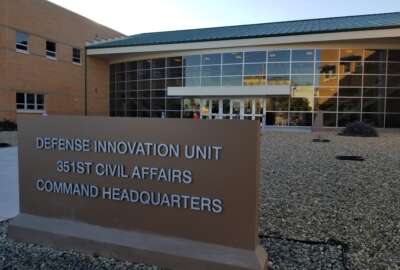Hubbard Radio Washington DC, LLC. All rights reserved. This website is not intended for users located within the European Economic Area.
Coast Guard still struggling with major acquisition programs
The Coast Guard’s biggest programs, the Offshore Patrol Cutter and the Polar Security Cutter are years behind schedule and billions of dollars over budget.
The Navy isn’t the only military service that struggles with big shipbuilding programs. Two of the Coast Guard’s biggest programs — the Offshore Patrol Cutter and the Polar Security Cutter — are years behind schedule and billions of dollars over budget. The Government Accountability Office (GAO) says those cost and schedule increases are signs of broader management and oversight problems. For more on the Federal Drive with Tom Temin, Federal News Networks Host of On DoD, Jared Serbu talked with Shelby Oakley, GAO’s Director for Contracting and National Security Issues.
Interview Transcript:
Jared Serbu I think it’s fair to say the Coast Guard has really had major struggles over the years with these major acquisition programs. I know your recent testimony was focused really on just a couple of those, the offshore patrol cutter and the polar security cutter. So what did those programs sort of tell us about the state of play in major shipbuilding programs across the Coast Guard, and how much things have improved or not over the years?
Shelby Oakley Yeah, unfortunately, I think with OPC (Offshore Patrol Cutter) and PSC (Polar Security Cutter), they are kind of indicative of the things that we’ve seen as struggles for Coast Guard shipbuilding, but also Navy shipbuilding over the years. Just major challenges with achieving stable designs to support actually beginning construction, and what that often results in is rework and delays and that kind of thing. And I think, OPC and PSC are delayed four and five years respectively, are now 11 billion and at least $2 billion over budget. So these outcomes are just a bit of a challenge, especially for an organization like Coast Guard with such a small budget for acquisitions.
Jared Serbu Yeah. And you talk about concurrency in the testimony, is that really the main issue here, moving ahead into later phases of the program before you really have a clear picture of what you’re doing?
Shelby Oakley It’s a huge issue. We’ve done a lot of work over the years on commercial shipbuilding. And the outcomes that commercial shipbuilders achieve are nothing like we see in the Coast Guard and the Navy. They are on time and on budget. And it’s not kind of a question. And the common things that we see them do, or what we call leading practices for shipbuilding and ship design, and one of the main parameters is they just don’t move forward until they’re, key elements of their design are matured. This is like structural layouts, where the equipment’s going to go. All sorts of things like that need to be figured out before you move forward and start cutting steel or bending metal, as they say, because any changes at that point really result in reverberating bad effects. And we saw that on PSC. They had designed the height of the deck, for one of the lower decks of the ship incorrectly. And that had reverberating design change impacts throughout the ship. Had they have begun constructing that ship, at this point, we would have been in big trouble. But at least they’re just focused on redesigning those aspects at this point.
Jared Serbu You mentioned the agency size issue earlier, and that’s kind of where my head goes sometimes when I think about the Coast Guard challenges relatively small agency doing incredibly complex engineering and acquisition work. But then I remind myself, well, the Navy has an entire command that’s, I think, bigger than the whole Coast Guard that does this stuff. And they face many of the same issues. So is there just something inherent to naval shipbuilding or is this really all process improvement stuff?
Shelby Oakley Yeah. I think one of the key differences that we see, between like government shipbuilding and commercial shipbuilding is this issue of lack of discipline. And this is sometimes driven by, the industrial base. So with commercial shipbuilding they have a ship lined up right after one another. So they have to keep those ships moving through the shipyards, otherwise there’s severe financial ramifications for those companies. That’s just not what we see in government shipbuilding. And government shipbuilding, they’re allowed to proceed with design, with construction too early. Any challenges that we run into, we end up just throwing more money at these programs. There’s been a lack of incentive in the industrial base because of kind of fits and starts of demand signal from the Navy and the Coast Guard. And so there’s a lack of incentive to do and key investments, in technology or processes that could improve their performance in design and construction. And so there is something about government shipbuilding that’s a little bit different. But if you look at the practices that we outline, there really just kind of common sense, they’re not shocking to anybody. They’re like logical and disciplined approaches that anybody would apply to their own life if you were buying a house or designing a pool.
Jared Serbu One of the things in in your testimony that was striking to me, as you talk about these very long periods between milestone events, which are, I guess, the triggers that are designed to get senior leaders to really review a program in depth and make course corrections if they need to. They’re like 4 or 5 years apart on these programs, like how big a role does that play in letting these things kind of spin out of control?
Shelby Oakley Well, it’s the early warning signal. If you don’t have a milestone for several years, you’re not tracking anything. You’re not tracking delays to that. So it doesn’t trigger this oversight review from Coast Guard officials or even DHS officials to be able to say, hey, wait, we’re heading in the wrong direction or things aren’t going so great, maybe we need to figure it out. And so we’ve made a number of recommendations over the years for the Coast Guard to add milestones to their acquisition baselines, so that there can be closer tracking of that progress to give a sense of how well the program is doing.
Jared Serbu These two programs that we were talking about, specifically the OPC and the PSC. They’re pretty far down the line at this point. On those programs specifically, to what extent is the diet kind of cast by past decisions that have been made? And how much can they specifically do to improve on these two?
Shelby Oakley Yeah. So I think there’s two separate answers there. So OPC as you know, has two stages. OPC stage one with just the first four ships are already underway and construction. OPC stage two is planning to start construction in September. And so we would suggest that the Coast Guard has an opportunity to make sure that the design of OPC stage two is matured sufficiently to be able to justify moving forward with that construction decision. And so if they do that, that could put them on a better path for OPC stage two. After those first 15 ships, the Coast Guard’s intending to buy 25 ships total. We think for that next ten, there’s an opportunity to really rethink how we’re going about building these ships and driving more of these commercial practices into their approaches for that. So we think that there will be an opportunity in the long run for this program to make some changes. With regard to PSC, they plan to start construction by the end of the year. And we made a recommendation that they ensure that their design is mature and they understand how everything’s working before they move forward with that. They concurred. But we have yet to have, confidence that they will actually ensure that the design is mature before they move forward. If they don’t, it’s going to lead to a lot of risky decisions and a lot of risky, risky outcomes that hopefully the Coast Guard at that point would more closely manage and ensure that we’re executing that program to the best extent possible, given the risk that we’ve accepted by moving forward.
Jared Serbu As you mentioned, these leading practices have been down on paper since 2009. Still not much evidence of them showing up in programs. Is this something Congress should consider getting involved in?
Shelby Oakley Yeah. So, we did our first tranche of work in 2009. And Congress has taken some action, specifically with regard to Navy programs, in requiring certain aspects of those leading practices. We have some matters for congressional consideration out there for Coast Guard programs that we’re hoping that the Congress takes a good look at, especially in light of our most recent report that we updated those practices, this spring. There are a lot of similarities, but some new nuances given ten years, ten plus years of advancements in technology that these commercial shipbuilders all around the world are really employing to a great extent and to great success.
Jared Serbu I did want to ask you one more question about the comparison between commercial and military. It seems like it wouldn’t be that easy for government work to just get plugged into one of these commercial shipyards that doesn’t already do much government work. That’s one of the issues here, you sort of do need people with government experience?
Shelby Oakley Yeah. I think we’ve seen on the, OPC and PSC that the shipbuilders have a lack of experience in government contracting. And that has led to some of the problems. They don’t have the systems or capacities available that a lot of these major shipbuilders have that are consistently in this kind of government space. And so with the commercial practices, we’re not necessarily saying go to commercial yards and have those ships built there. What we’re saying is these builders that work for the government, that’s their primary business, need to begin thinking about those practices that commercial builders use and how they could apply them in the government space to achieve better outcomes. And the DoD and the Coast Guard play a role in incentivizing them to do that, and requiring them to do that.
Copyright © 2024 Federal News Network. All rights reserved. This website is not intended for users located within the European Economic Area.
Jared Serbu
Jared Serbu is deputy editor of Federal News Network and reports on the Defense Department’s contracting, legislative, workforce and IT issues.
Follow @jserbuWFED
Related Stories
On DoD

WEDNESDAYS, 11 A.M. & 2 P.M.
Each week, Defense Reporter Jared Serbu speaks with the managers of the federal government's largest department. Subscribe on PodcastOne or Apple Podcasts.





